"We need F-16s." An interview with Ukrainian pilot Karaya about the enemy, unmanned aircraft, Top Gun and faith in God
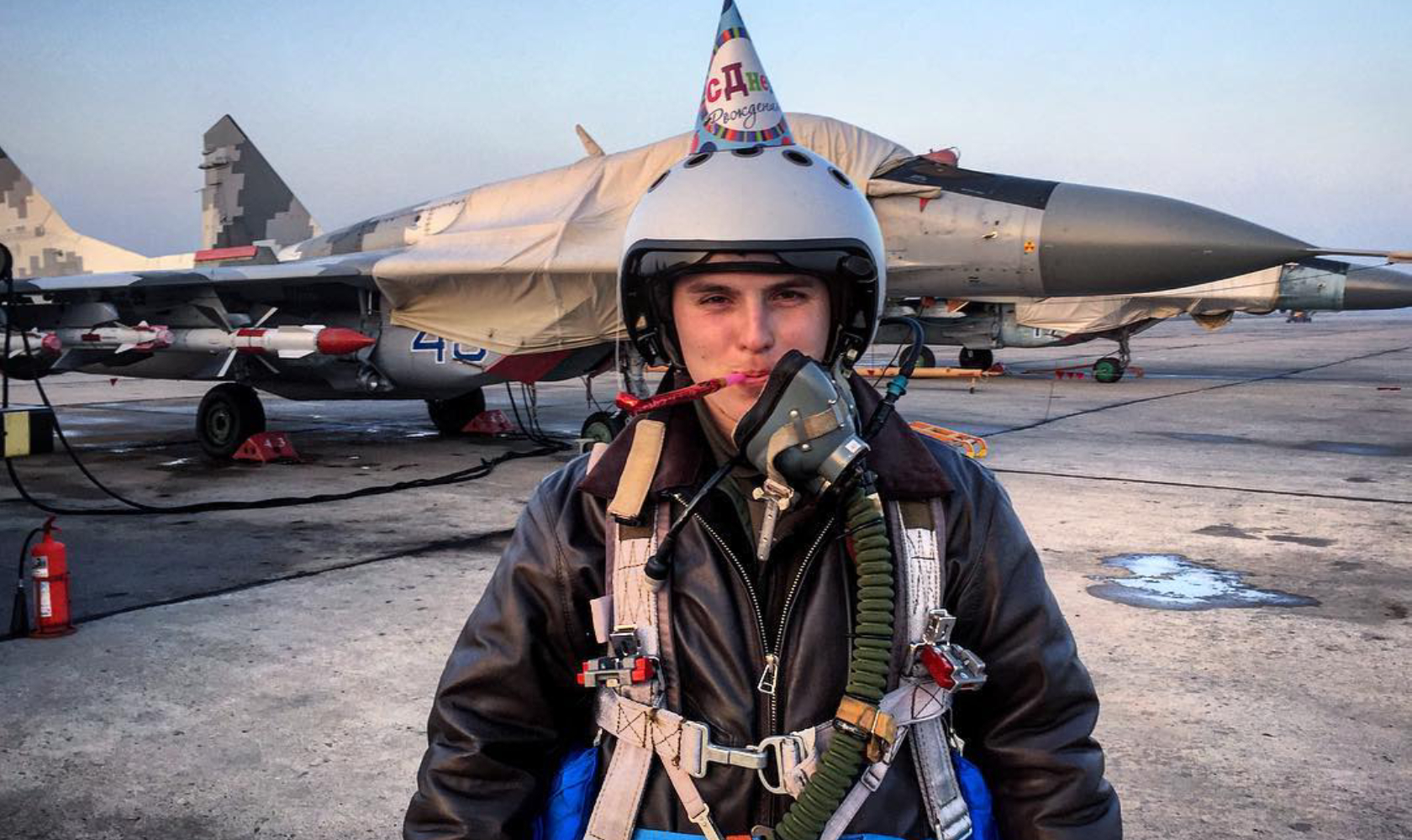
On 12 October 2022, 28-year-old pilot Vadym Voroshylov, aka "Karaya", downed five combat drones, steered his damaged aircraft clear of the city of Vinnytsia, ejected, and rediscovered his faith in God. A selfie that he took of his blood-covered face right after ejecting went viral.
"I always believed in God," Vadym told UP. "I have a small tattoo of a cross. In our job it’s not always possible to wear a real one [on a chain] - it could get in the way or you might lose it - so I got the tattoo back in 2014.
I’ll be honest with you, when the full-scale invasion started, when I lost brothers of mine - incredible, wonderful guys, the finest sons of the Motherland - I did feel despair. But after 12 October, when everything unbelievably aligned in my favour, I realised that a higher power exists and influences our lives."
Voroshylov had resigned from the Armed Forces when his contract came to an end in 2021 and joined civil aviation, but after 24 February he returned to the military.
President Zelenskyy awarded him the title of Hero of Ukraine for his part in the air battle in the Vinnytsia skies last autumn.
In this interview, Karaya tells UP about his call sign, the future of Ukrainian aviation, the western aircraft that is needed to dominate the sky, his attitude towards the enemy, and its latest weapons.
"We perceive the enemy only as a target"
(Yevhen Rudenko): Vadym, when I first saw you in the media, I remembered the Russian pilot captured in Chernihiv. He was so… chubby. Is this the enemy’s problem with physique, or is it my stereotype about aviators who supposedly all have to be super fit?
(Vadym): (Smiles). That was Krasnoyartsev. I wouldn’t say they have that problem. But indeed, we now have a new concept of flight personnel training. Since 2014, the emphasis has been more on young people as the main force of strike aviation. From the statistics of aircraft shootdowns, from the military we’ve captured, we see that these are… I can’t even say "boys" – adult men. We must understand: the younger a person is, the faster his brain works. That’s very important in aviation.
(I): Some Russian pilots who were captured tried to convince people that they didn’t know they were bombing residential buildings because they were working according to the coordinates provided to them. Is it possible to believe this?
(V): I don’t believe that at all. They have ordinary navigation systems like Garmin, tourist ones, in various modifications. Perhaps their public accepts this propaganda [that Russian aircraft do not hit civilian targets – ed.], but our society is quite educated. You don’t need to be an aviator to understand: if a person enters the latitude and longitude into a tourist navigator, they can clearly see what is there. Of course, if a coordinate is entered within a certain settlement, it is immediately clear that you are working on that settlement. They do it like railway lines, as they say. This is an ordinary aircraft bomb, which has just a flight trajectory, and the accuracy of bombing depends on a bunch of factors, ranging from the skills of the pilot to meteorological conditions. So I don’t believe in this legend.
(I): What is considered an accurate strike with low-precision weapons?
(V): I can say roughly: according to the standards, the enemy’s bombing is considered "excellent" if it is within plus or minus 50 metres. In urban conditions, even this is a huge error.
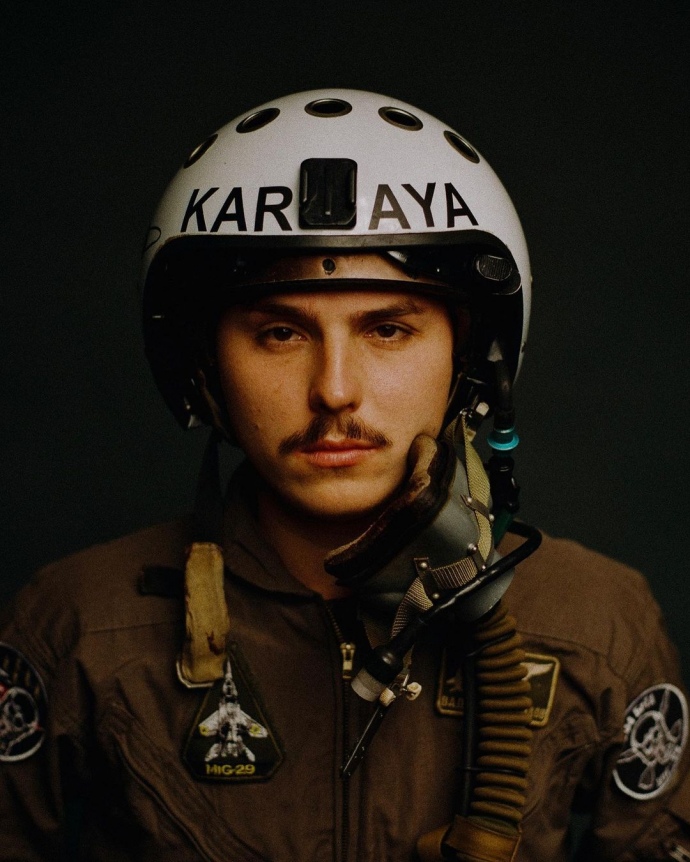
(I): Let’s imagine a hypothetical situation: you are ordered to bomb targets in residential areas. What will you do?
(V): We have already discussed this with our sworn brothers. Firstly, I don’t want to talk about it hypothetically because it is impossible in theory. Our military and political leadership will not allow it. If we look at it more abstractly, the pilot and navigator in an Su-34 [Krasnoyartsev’s downed plane – UP] always see the target’s location, at least through navigation. Yes, they are given a mission to accomplish. But no one will fire them, and no one will put them in prison if they drop bombs, for example, in an open field, a kilometre or two away from residential buildings, with overflight or underflight. It will just be a "mistake in piloting technique and poor training" – that’s all! So that’s all there is to it. But such an option could be considered if they were people. They fully and completely understand what they are doing. This is their traditional scorched earth tactic. This is what they have done before in Ichkeria [Chechnya], in Georgia, in Syria.
(I): How did you formulate your attitude toward the enemy? Do you feel anything like respect for their pilots?
(V): We don’t treat them as a specific, living person, but as air targets. They just turn into dry figures in the daily summary of the General Staff [the Russian army losses – ed.], no more.
Of course, there were cases of respect for enemy pilots in history, but a long time ago, in the First World War. Then there were more honourable relations, if I may say so.
Back then, they declared war, signed the act of war, and then went to their positions. Now, the enemy had been saying for several months that they were not going to attack, and then treacherously attacked peaceful cities of Ukraine in the morning.
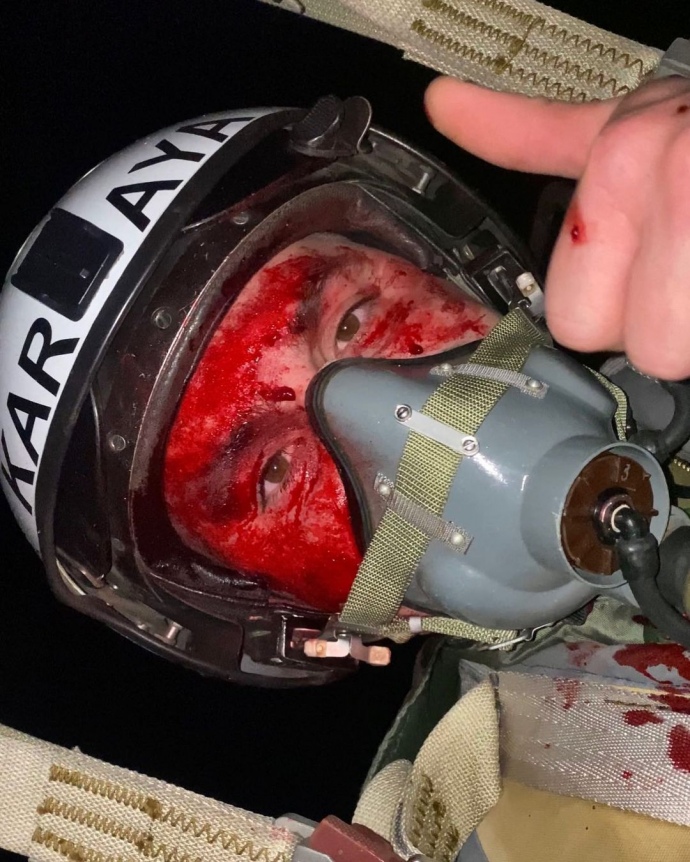
Vadym Voroshylov: Pilots treat their aircraft as a living thing, not a pile of metal and equipment. The pilot feels pain upon the loss of an aircraft
Instagram Vadym Voroshylov
"We are absolutely ready for anything"
(I): What most distinguishes our pilots from the enemy’s?
(V): There is a lot to say, but I will just say that we perform tasks that technically were not even considered at the design stage of our aircraft.
We have very limited technical capabilities, but we do everything we can to destroy the enemy. We try to work effectively in more extreme conditions and are absolutely ready for anything.
The enemy, having an advantage, operates according to what is written in the textbooks on tactical and fire training. We use more modern methods which are not written in any textbook of any country in the world.
(I): So NATO pilots will have something to learn from ours after this war?
(V): Yes (smiles).
(I): Is it playing a cruel joke with the Russians that they have so much equipment? Do they act, as they say, "at ease" or not?
(V): You are right. But don’t underestimate the enemy. They are dangerous. I don’t like it when people say they’re losers like Chmonya [a nickname given to a soldier who was captured in March and quickly became the subject of various memes due to his short stature and hangdog look]. No! This is the enemy. They have a significant advantage in aircraft and ground air defence. They know what they’re doing and they are learning from this war, just like we are.
When we talk about comfortable conditions for the enemy, we mean the ability of their fighter aircraft to operate without entering our air defence zone. But when they get into this zone, you see pluses opposite the destroyed air targets in the General Staff reports every time.
(I): Is there anything surprising about them? Maybe some specific types of aircraft?
(V): Yes, but not their aircraft. It should be understood that a plane is more of a platform, a carrier of aviation means of destruction, and that it is these means that can give an advantage in the air.
Recently, the Russians have developed R-37M long-range air-to-air missiles. We can say that this is their newest weapon, although it is a Soviet development which they have modernised. Their declared range of air targets is very serious – up to 400 km. In fact, we are seeing smaller figures, but this means of destruction is still very dangerous.
However, we constantly analyse air battles involving these missiles and find methods to combat them.
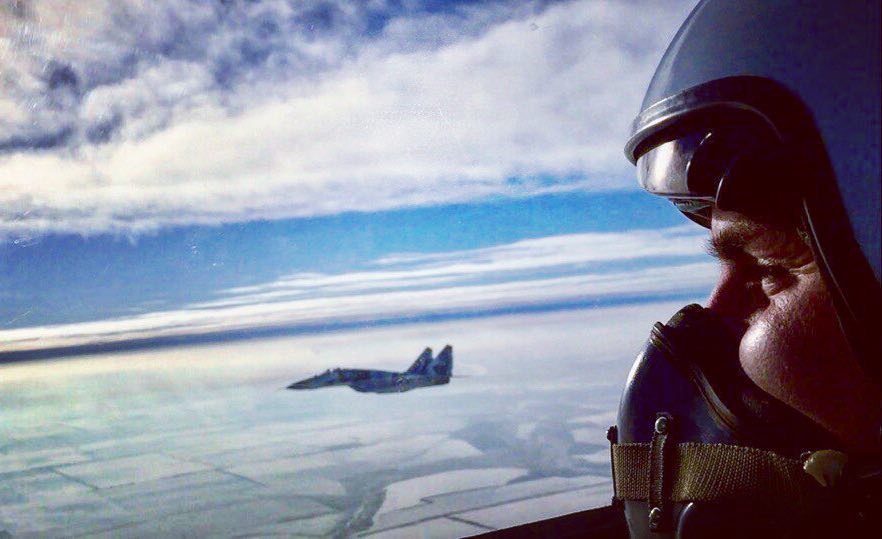
(I): What military target do you dream of destroying?
(V): I can list three (smiles): Tu-95s, Tu-160s, and Tu-22M3s. These targets threaten our cities and civilians, but they don’t enter the target zone of our tactical aircraft. They are afraid to, and they insidiously make launches on the territory of Ukraine.
At the moment, the only possibility of destroying them I can see is when they are at the airfields (smiles). So far, this is the only way.
But there are still enemy strike aircraft operating over the temporarily occupied territories, and if we had the technical capability, we would completely paralyse the enemy in Ukrainian airspace. Western-type fighters will help to reveal 100% of our potential.
(I): Are you among those who believe that they should be F-16s?
(V): Yes, we need a massive aircraft that exists in the world. Of course we can consider different types, such as Gripen and Eurofighter. They are more resistant to our airfield infrastructure, but they are not massive. There is no, let’s say, "secondary market" for such aircraft in the world. The F-16 is one of the most massive aircraft of its class in the world. So we will be able to service them and, most importantly, thanks to our Western partners, we will have no shortage of means of destruction. These are the main reasons why we need the F-16. If we consider the time after victory, there is much to choose from. Of course, there are aircraft that I would say are almost perfect in terms of combat capabilities. These are the F-22 and F-35. But at the moment, the F-16 will greatly improve the situation and help our defence forces as a whole.
"Unmanned aviation is the future, but..."
(I): Most people know about modern military aviation mainly from Hollywood movies. Have you seen the film Top Gun?
(V): Of course (smiles). I am a fan of the first part. When I was a cadet, I flew on light aircraft. At that time, I did not deal with jet technology and I watched this movie with wide-open eyes. But now, everything is perceived differently. You must understand that this is not a documentary: it’s a feature film. Regarding the second part of Top Gun, I will say that it is a very beautiful, aesthetically filmed fairy tale. There are many shots of real piloting. But the conduct of air battles, the work of the anti-aircraft missile systems – they don’t quite reflect reality, let’s say (smiles). But I was very interested in watching this film from the point of view of how they shot it, and the emotions it evokes. Films like this encourage young people to join the army, not only the US Air Force but the military in general.
(I): When you dreamed of flying, did you ever think you would have to fight?
(V): Yes, I did.
(I): And if you had been told you would have to, would you have gone into military aviation?
(V): At a deep level, there was still an understanding that the army exists to conduct combat operations, offensive or defensive. At that time, of course, no one could imagine it. But I would have gone anyway.
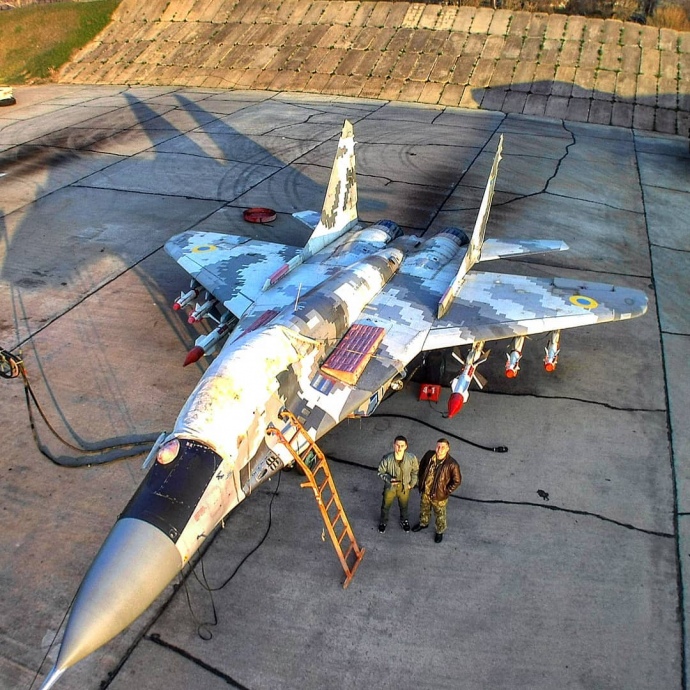
(I): This war has already led to unmanned aviation development. Doesn’t it hurt to see how everything is heading towards a point in the future when pilots in the sky will no longer be needed?
(V): As combat operations have shown, the efficiency of reconnaissance aviation and the effectiveness of drones in suppressing air defence systems is an extremely important element of weapons. Now there is a boom in unmanned aviation, and it will only improve. Some countries, like Turkey, are beginning to produce drones to engage air targets. Last year the United States performed the first aerial refuelling from an unmanned aircraft. Of course, this is the future. But we must always understand that in a critical situation, only a human being can assess the situation and make decisions in the air. I believe unmanned aviation is the future, but only when working in conjunction with traditional aviation.
(I): Would you now exchange your work in the air during the war for a drone console somewhere safe?
(V): No, I wouldn’t. I choose to work in the sky. It gives you experience and a more effective use of weapons and emotions.
(I): Emotions? I got the impression that you are a very balanced person, almost without emotions.
(V): There are emotions - they just don’t manifest themselves outwardly. They are somewhere in your soul. You understand that you are doing something that saves people’s lives and helps to defeat the enemy. I don’t even know how to describe these inner emotions. You’ve done your training, improved your skills, and now the time has come when you need to show what you can do to protect the state.
(I): What does our military aviation lack the most? People, equipment, or both?
(V): The first thing we need is to increase the range that our radar and sighting systems can see. The second is air-to-air guided weapons with a much longer range than we have now. So we really need F-16s that can meet our needs in that regard.
(I): It is a bit early to talk about it now, but how do you see the future of Ukrainian aviation?
(V): I see it (smiles). After the full-scale invasion, I am sure we will have Western-style aircraft. After the victory, there will be modernisation of equipment and the training system. We will have more modern aircraft. Our industrial capacities should be implemented and developed together with Western companies. Of course, we are inferior in electronics and aircraft equipment, but we have tremendous experience in the design of airframes, rocketry, and engine production. To make a perfect product, we must combine our experience with Western experience.
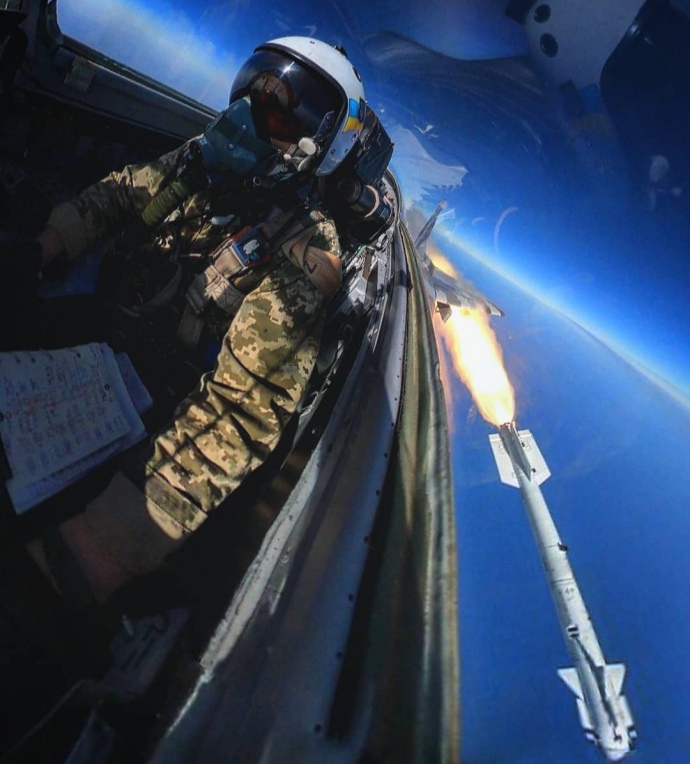
"I’m trying to live one day at a time"
(I): You are active on your Instagram page, you don’t hide your face, people in the streets recognise you and thank you. Do Russians send you threats?
(V): Not at all. At all! I was very surprised by this. Maybe that’s because their leadership says we don’t have any aircraft and that they destroyed everything right away (smiles)? And they don’t want to say anything about Ukrainian pilots in their information space so that their citizens won’t be surprised?
Some of their media outlets said - I’ll quote them - "A Ukrainian Nazi pilot has been shot down." There was a short video where they mentioned my call sign and talked about Hartmann, who received the Iron Cross from Hitler [Erich Hartmann, aka Karaya 1, was a world-famous German ace pilot in World War II - ed.].
(I): But the propagandists don’t mention that Hartmann was exonerated in the Russian Federation in 1997, and that they admitted unlawfully sentencing him to 10 years in the camps "for war crimes"...
(V): Yes…
The story of my call sign goes way back to 2014, when the Russians launched their propaganda machine and started calling Ukrainians "Nazis". Then my old Instagram account was hacked. I created a new one and was wondering what username to choose.
I’m interested in world history and I knew about Hartmann. So I decided to sign it as Karaya. It was mostly a joke precisely because of the Russian propaganda, to make fun of them (laughs). And then it kind of stuck.
Everyone knows that Hartmann was a genius pilot. He went through Stalin’s camps, then served in West Germany and even trained American pilots.
He said in an interview in his old age that when he was young, he just wanted to fly and did not support the policy of his military and political leadership.
(I): By the way, when I hear the call sign Karaya, I think of it as being very similar to the Ukrainian words ‘kara’, ‘karaty’ [punishment; to punish - ed.] …
(V): (Laughs). If you look at it like that, it makes more sense [‘Karaya’ is a German love song - ed.]. If you see parallels with Ukrainian, it sounds more relevant (smiles).
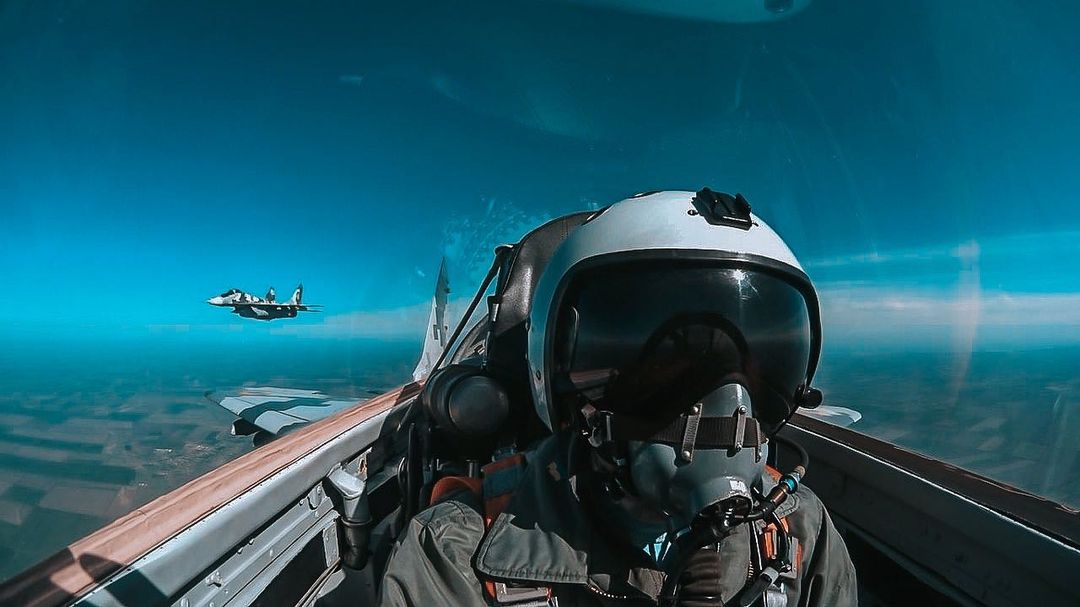
(I): What will constitute victory in this war for you?
(V): In my opinion, signing a peace treaty with the aggressor country would only produce a pause during which their forces would regroup, nothing more; when the enemy would accumulate enough people and equipment, analyse everything, and attack us again - if their state remains in the same format and with the political vector as it is now. I consider victory to be when the enemy’s power and politics change. Ideally, victory is the collapse of the empire. And of course, an obligatory point is the restoration of Ukraine’s territorial integrity and the return of all occupied territories together with Crimea.
(I): I know that the military does not like forecasts regarding the timing of the end of the war. But I will ask this: when will we see civilian rather than military aircraft in Ukrainian skies again?
(V): At the moment, I don’t want to make any forecasts. Of course, I have a personal opinion, but I don’t want to make it public. I have no moral right to make forecasts, not least because I don’t have all the strategic information.
Since 24 February, I try to live one day at a time, or rather, right now and right here. Before, I could postpone important life decisions until, as they say, more convenient times. Now, if there is an opportunity to do something, you should definitely do it - don’t put it off.
No one knows whether tomorrow will come. We must not stop, we must live here and now.
Yevhen Rudenko, Ukrainska Pravda
Translation: Volodymyr Tretiak, Wartranslated
Editing: Teresa Pearce
Journalists fight on their own frontline. Support Ukrainska Pravda or become our patron!